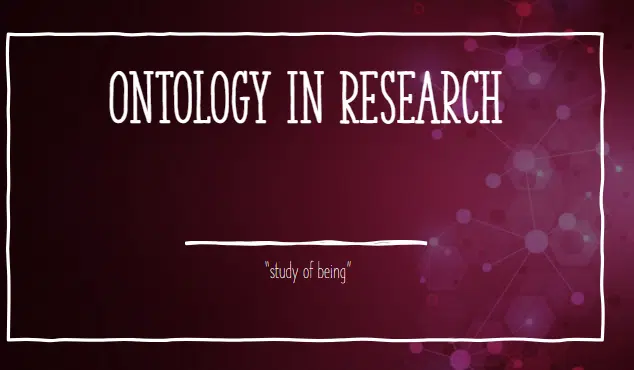Ontology is a branch of philosophy that deals with the “study of being”. In the broader sense, it refers to the nature of reality or the nature of an entity to be studied. Ontology plays a central role in defining epistemology and research methodology.
However, two main questions need to be answered in the context of ontology. A researcher is interested in knowing whether social entities are objective and inert to social actors or whether these entities are affected by the perceptions and actions of social actors. For instance, a researcher might be interested to know if an organization’s culture is affecting the behavior and conduct of employees or if the behavior and conduct of employees are shaping the organization’s culture. When a social entity is considered inert, objective, and external to social actors, it is called Objectivism. When a social entity is affected by the perception, actions, and conduct of social actors, it is called Constructivism.
What is Objectivism?
Objectivism, which posits that social entities are inert, objective, and external to social actors, implies that the actions, perceptions, and conduct of social actors cannot affect the nature of an entity. Moreover, it underpins the idea that social phenomena are shaped by the collective or individual actions of these social actors. Objectivism also states that the social environment affects individuals’ actions, perceptions, behaviour, and cognitive process. However, these social actors cannot influence the external social entity through their actions. Objectivism is relevant to the research philosophy of Positivism.
According to Britannica, objectivism means that individuals’ perceptions cannot alter the existence of things and reality in the world.
Objectivism pays attention to the existence of objects, not their interpretations and views of people about these objects. It holds that there is only one universal reality, whether one knows about it or not. For instance, Mount Everest is the highest peak in the world, and it is a reality that cannot be affected by the views of people. None can change this reality through prejudice or bias.
What is Constructivism?
Constructivism is also called constructionism or subjectivism. However, this ontological position is opposite to objectivism. It views social entities as being affected by the perceptions of social actors and constructs based on their interaction. This ontological position considers that entities are continuously affected by social actors’ cognition, behaviour, and actions. Something can be the fact for certain people at certain places and times. Others do not consider it a fact. For instance, a painting is attractive for some observers but not others. People hold diverse opinions and views that can affect social entities constantly.

According to constructivism, knowledge is constructed from human experience and is subjective. There is no universal reality, and it keeps on evolving. This ontological position is relevant to the research philosophy of Interpretivism.
References
Bryman, A. (2008). Social Research Methods (4th ed.). Oxford: Oxford University Press.
Creswell. (2007). Research Design- Qualitative and mixed methods approaches. London: Sage Publishers.
Saunders, M., Lewis, P., & Thornhill. (2012). Research Methods for Business Students (6th ed.). Pearson Education Limited.




